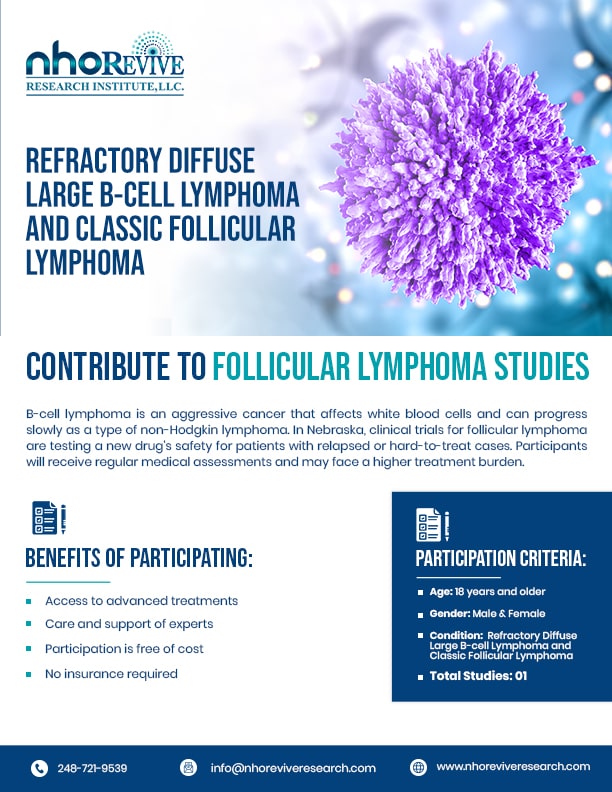Explore and discover the newest developments in follicular lymphoma clinical trials. Participate now to make a difference and be a part of advancements in a follicular lymphoma research study.
Follicular Lymphoma Clinical Trials
Understanding Follicular Lymphoma Clinical Trials in Nebraska
Explore Potential Treatment for Follicular Lymphoma
B-cell lymphoma is an aggressive cancer that triggers white blood cells responsible for fighting infections, adversely affecting them. Classic lymphoma tends to grow slowly and gradually, and it is a form of non-Hodgkin lymphoma. Follicular lymphoma clinical trials in Nebraska aim to evaluate and assess the safety of the investigated drug in individuals with relapsed or refractory diffuse large B-cell lymphoma.
Additionally, participants undergoing follicular lymphoma clinical trials must be affected by this condition and have received at least one prior systematic therapy. Moreover, follicular lymphoma clinical trials involve a higher treatment burden than the standard ones. To monitor the investigated drug’s effects, participants will be monitored at an approved institution through medical assessments.
Eligibility Criteria for Follicular Lymphoma Clinical Trials
- Age: 18 years and older (Adults and Older Adults)
- Gender: All
- Total Studies: 01
- Participants must be diagnosed with follicular lymphoma symptoms.
*Participation in our clinical study is voluntary, and it’s important to consult with your healthcare provider before making any decisions related to your treatment or care. *
*Participation in the clinical trials causes no expenses for you or your private medical insurance. You’ll receive compensation for your time and travel.
About Follicular Lymphoma and More
Follicular lymphoma is a type of non-Hodgkin lymphoma that grows and affects B-cells that are part of the immune system. Follicular lymphoma symptoms typically originate in the lymph nodes, they can spread through other parts of the body and organs, including the spleen and bone marrow. In addition, follicular lymphoma can reoccur after the initial therapy.
Furthermore, symptoms may include painless swelling of the lymph nodes, fatigue, fever, night sweats, and weight loss. Treatment options may vary based on the severity or intensity of this disease prevalent in an individual. Ongoing clinical research studies and follicular lymphoma clinical trials in Nebraska are crucial for developing new potential treatments for bone marrow cancer for favorable outcomes and desired quality of life.
What to Expect
If you volunteer for NHO Revive clinical trial by completing the form above, our study team will reach out to assess your eligibility for this follicular lymphoma clinical trials. They’ll review the study specifics with you to check if you meet the criteria for participation. If you qualify, you’ll be invited to the study site for screening, located within a 50-mile radius of where you are now.
The doctors will discuss the trial’s duration and its impact on your cancer treatment. Once everything is explained, participants will be asked to sign an informed consent form. Make sure to go through everything with your provider. We value transparency between our participants and investigators
*You’ll receive study-related care at no cost, including comprehensive physical exams and evaluations conducted by skilled physicians.
Age
18 Year and Above
Gender
All
Location
Nebraska

300
Risk Factors for Individuals with Lymphoma
Follicular lymphoma poses challenges due to its recurrence and resistance to initial therapy, complicating diagnosis and management. Furthermore, Age, genetic mutations like BCL2, BCL6, or MYC translocations in DLBCL, and immunosuppression history increase risks. Meanwhile, classic follicular lymphoma is influenced by age, gender, environmental factors, and genetic predisposition. Follicular lymphoma clinical trials in Nebraska are studying patients to identify biomarkers and targeted therapies for effective risk management in these lymphomas.
Frequently Asked Questions
Interested in learning more about our research? Explore our frequently asked questions to gain knowledge about this condition.
How is Follicular Lymphoma different from other lymphomas?
Follicular Lymphoma is a slow-growing type compared to other lymphomas. While it requires treatment, the focus is often on managing the disease and preserving quality of life for as long as possible.
What are some common treatment options for Follicular Lymphoma?
Treatments can vary depending on the stage and individual case, but may include watchful waiting, chemotherapy, immunotherapy, or radiation therapy.
What are treatment options for Refractory Diffuse Large B-cell Lymphoma (RDLBCL)?
RDLBCL refers to DLBCL that has not responded well to initial treatment. Options may include salvage chemotherapy, high-dose chemotherapy with stem cell transplant, or participation in clinical trials exploring potential novel therapies. Discussing all options with your doctor is crucial to determining the best course of action.
Can I withdraw from a clinical trial if I change my mind?
Yes, participants can withdraw from a clinical trial at any time for any reason. It is important to communicate your decision with the trial’s medical team so they can ensure your safe transition out of the study.
What happens if I’m chosen to participate in trials Follicular lymphoma clinical trials in Nebraska?
You will undergo a detailed informed consent process that explains the trial protocol, potential side effects, and your rights as a participant. This process ensures you understand all aspects of the study before you agree to participate.





